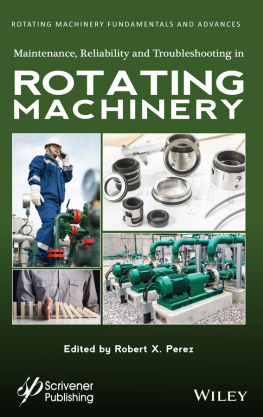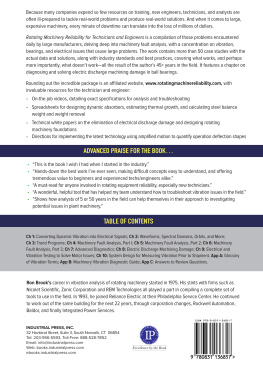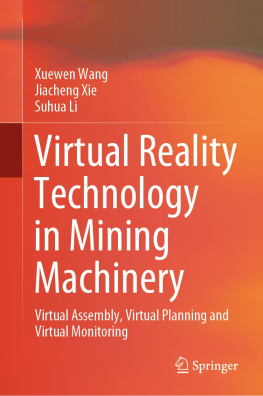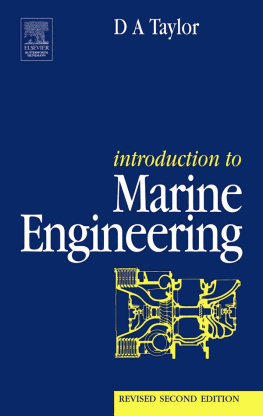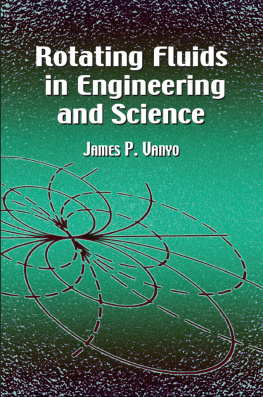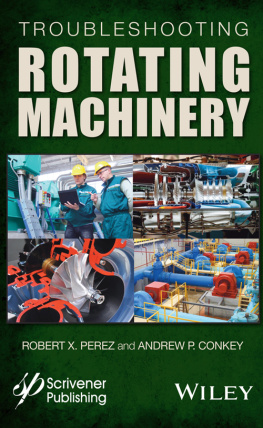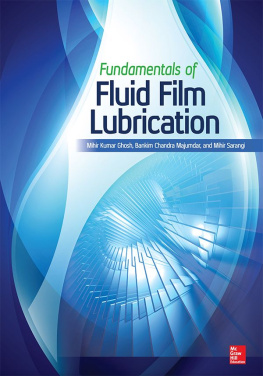
Scrivener Publishing
100 Cummings Center, Suite 541J
Beverly, MA 01915-6106
Publishers at Scrivener
Martin Scrivener ()
Phillip Carmical ()
Maintenance, Reliability and Troubleshooting in Rotating Machinery
Volume 2
Edited by
Robert X. Perez

This edition first published 2022 by John Wiley & Sons, Inc., 111 River Street, Hoboken, NJ 07030, USA and Scrivener Publishing LLC, 100 Cummings Center, Suite 541J, Beverly, MA 01915, USA
2022 Scrivener Publishing LLC
For more information about Scrivener publications please visit www.scrivenerpublishing.com.
All rights reserved. No part of this publication may be reproduced, stored in a retrieval system, or transmitted, in any form or by any means, electronic, mechanical, photocopying, recording, or otherwise, except as permitted by law. Advice on how to obtain permission to reuse material from this title is available at http://www.wiley.com/go/permissions.
Wiley Global Headquarters
111 River Street, Hoboken, NJ 07030, USA
For details of our global editorial offices, customer services, and more information about Wiley products visit us at www.wiley.com.
Limit of Liability/Disclaimer of Warranty
While the publisher and authors have used their best efforts in preparing this work, they make no representations or warranties with respect to the accuracy or completeness of the contents of this work and specifically disclaim all warranties, including without limitation any implied warranties of merchantability or fitness for a particular purpose. No warranty may be created or extended by sales representatives, written sales materials, or promotional statements for this work. The fact that an organization, website, or product is referred to in this work as a citation and/or potential source of further information does not mean that the publisher and authors endorse the information or services the organization, website, or product may provide or recommendations it may make. This work is sold with the understanding that the publisher is not engaged in rendering professional services. The advice and strategies contained herein may not be suitable for your situation. You should consult with a specialist where appropriate. Neither the publisher nor authors shall be liable for any loss of profit or any other commercial damages, including but not limited to special, incidental, consequential, or other damages. Further, readers should be aware that websites listed in this work may have changed or disappeared between when this work was written and when it is read.
Library of Congress Cataloging-in-Publication Data
ISBN 9781119631644
Cover image: Pixabay.Com Cover design by Kris Hackerott
Set in size of 11pt and Minion Pro by Manila Typesetting Company, Makati, Philippines
Printed in the USA
10 9 8 7 6 5 4 3 2 1
Dedication
This book series is dedicated to rotating machinery professionals around the globe who have devoted their careers to repairing, evaluating, and optimizing their equipment. It is through their diligence that critical machines are able to operate safely, efficiently, and reliably between scheduled outages.
Preface

Good reliability engineering is not the search for perfectionrather, it is the search for pragmatic solutions to business problems.
H. Paul Barringer, Reliability Consultant
Rotating machinery represents a broad category of equipment, which includes pumps, compressors, fans, gas turbines, electric motors, internal combustion engines, etc., that are critical to the efficient operation of process facilities around the world. These machines must be designed to move gases and liquids safely, reliably, and in an environmentally friendly manner. To fully understand rotating machinery, owners must be familiar with their associated technologies, such as machine design, lubrication, fluid dynamics, thermodynamics, rotordynamics, vibration analysis, condition monitoring, maintenance practices, reliability theory, etc.
The goal of the Advances in Rotating Machinery Series (3 volumes) book series is to provide industry practitioners a time-savings means of learning about the most up-to-date rotating machinery ideas and best practices. This three-book series will cover industry-relevant topics, such as design assessments, modeling, reliability improvements, maintenance methods and best practices, reliability audits, data collection, data analysis, condition monitoring, and more.
Volume 1 of the series focused on design and analysis. Volume 2 covers important machinery reliablity concepts and offers practical reliability improvement ideas. Best-in-class production facilities require exceptional machinery reliablity performance. In this volume, exceptional machinery reliability is defined as the ability of critical rotating machines to consistently perform as designed, without degradation or failure, until their next scheduled overhaul.
Specifically, Volume 2 contains the following content adressing machinery reliability:
- General Reliablity Advice
- Design Audits and Improvement Ideas
- Maintenace Best Practices
- Analyzing Failures
This volume provides readers with sound advice that can be used to assess and improve the reliablity of a broad range of process machiney, including process pumps and compressors, gas and steam turbines, and mechanical seals and their support systems. I hope readers will find this book to be a useful addition to their technical libraries.
Robert X. Perez, Editor
Fall 2021
Acknowledgements
I would like to thank all the contributors for their expert advice and their clear and insightful prose. Without them, this book series would not have been possible. I would also like to thank the publisher for believing in me and allowing me to develop this comprehensive book series. Finally, I would like to thank my wife for reviewing my drafts and for her encouragement.
Part I
GENERAL RELIABILITY ADVICE
Machinery Reliability Management in a Nutshell
By Robert X. Perez
How to Think Like a Machinery Reliability Professional

Managing the risk associated with a sites process machinery is a key role of a machinery reliability engineer.
An important role of a machinery reliability professional is to evaluate reliability performance of site machinery and provide clear feedback and recommendations to the owners to ensure process reliability goals are met (). My aim here is to give the reader a sense of how machinery reliability professionals approach the assessment of site assets. By briefly covering the key machinery factors used in my evaluations, I hope to shine a light on the evaluation process. My process requires that each machines criticality, history, and current site safeguards be carefully reviewed and evaluated. Only when this process has been completed can a machinery reliability engineer provide useful feedback that will hopefully have a positive impact on the sites overall reliability.
Next page
